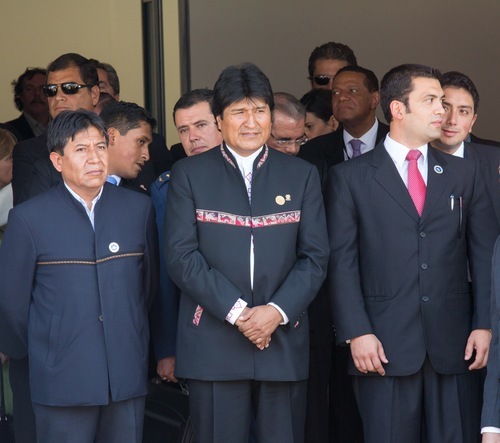
Progressive political movements in Venezuela, Argentina, and Brazil have recently encountered reverses. Bolivian President Evo Morales is his country’s longest serving president and first indigenous one. Now his 10 – year old socialist and anti-imperialist government faces a hurdle.
On February 21, 2016 Bolivians will vote on a referendum aimed at modifying Bolivia’s constitution to allow the president and/or vice president to be reelected twice instead of once. Partisans of Morales and Vice-President Alvaro Garcia Linare’s change – oriented government will cast a “yes” vote. But defenders of the old order are rallying, and the United States is at their service.
Under Morales, the Bolivian people have made striking gains. So much so, writes former Cuban National Assembly head Ricardo Alarcon, that “Never has so much been done, in such a short time, for the emancipation of a people subjugated for centuries.”
Poverty, for example, is down 25 percent, extreme poverty 50 percent. The minimum salary is up 87.7 percent, and, between 2005 and 2012, the state’s budget for healthcare rose from $195 to $600 million. Rates of infant and maternal mortality have fallen dramatically. Funding for these changes derived from nationalization of hydrocarbon extraction.
The economy has grown at an average annual rate of 5.1 percent, tops in the region. Internal economic demand is up and, “rather than exports, is the principal motor of economic growth.” Inflation in Bolivia is the second lowest in South America.
Argentinian journalist Juan Manuel Karg catalogued other advances. Some 40 percent of the population receives social security benefits including retirees, students – to keep them in school – and expectant mothers. The government has enlarged and improved 700 education centers and enrolled 955,000 people in literacy programs. In 1992 owners of large land holdings controlled almost 40 percent of all land, but in 2015 the state had charge of 24.6 percent of land; indigenous peoples, of 23.9 percent; and owners of small and mid-sized holdings, of 18.2 percent and 6.7 percent, respectively.
Negotiations with Chile for gaining Bolivian access to the Pacific Ocean are bearing fruit, says Karg. Bolivia is an indigenous – majority nation and establishment of a multi-national state under Bolivia’s 2009 Constitution ensured indigenous representation in parliament and both judicial autonomy and self-government for indigenous peoples. And with a prominent role in alliances that project regional unity, “Bolivia has become an influential voice in Latin America.” Morales has gained worldwide attention as an advocate for sustainability and environmental protection.
Good news is one thing, but mounting anti-government agitation ahead of the referendum vote is another. Big landowners, merchants, and facilitators of the former free-rein hydrocarbon industry are backing the campaign for a “no” vote. During Morales’ first term in office, many of them resorted to violence and racism as they maneuvered to separate Bolivia’s productive eastern departments from the nation. In 2008 a few helped out with an anti-Morales assassination plot.
Buenos Aires academician Atilo Boron sees signs of a revived anti-Morales conspiracy, and “Its epicenter is in Washington DC.” He claims that the International Republican Institute and the National Democratic Institute, each affiliated with the National Endowment for Democracy (NED), are “financing opposition political activities.” The U. S. agencies arrange for the “arrival of agents and advisors ready to instruct youths, women, and indigenous people on themes relating to democracy.”
Boron says the U. S. embassy in La Paz has paid out $200,000 towards the current referendum campaign, the focus of which is on supposed governmental corruption and ties to narco-trafficking. He names U.S. agents and rightwing Bolivian politicians who are their clients. In December, 2015, the Bolivian government expelled U.S. Vice Consul Ari Avidar, claiming that as a CIA agent he held “clandestine meetings with leaders of social movements.” A report in 2015 described a recent sting operation carried out by the U.S. Drug Enforcement Agency (DEA) which led to indictments against Bolivian military and police officials.
President Morales in 2008 expelled U.S. Ambassador Philip Goldberg and the DEA; he accused both of trying to undermine his government. According to Boron, “between 2003 and 2014 the NED dispensed $7.7 million to 20 institutions in Bolivia, always with political objectives.” That sum may have included the half million dollars paid Bolivia’s National Press Association beginning in 2008.
An International Committee made up of prominent Latin American intellectuals, artists, and political writers on February 3 announced its support for Morales in the upcoming referendum. Data from pre-referendum opinion surveys are inconsistent, although popular support for a “yes” vote is not likely to match the overwhelming support Morales received in elections earlier. In January the Congress of the Bolivian Workers’ Central (COB), the country’s largest labor organization, backed “struggle to build a new socialist society,” called for “an alliance of peasants and workers,” and expressed support for the “constitutional modification.”
The stakes are high. Ricardo Alarcon was thinking about Tupak Katari. Just prior to the indigenous leader’s torture and death in 1781 at the hands of Spanish colonialists, he proclaimed, “I will die but I will return and be millions.” “Evo and his people have converted that prophecy into a reality,” says Alarcon.